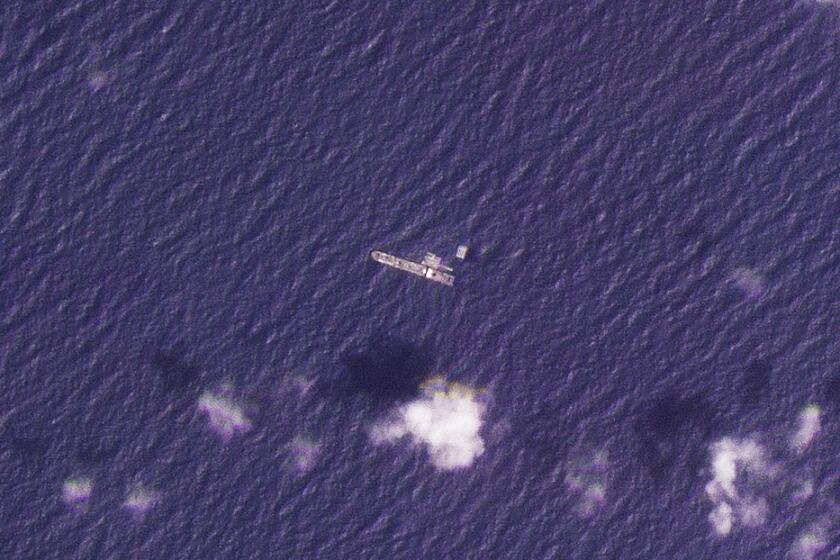26.2-Mile Grind Takes Its Toll in Battered Bodies
Bloody socks were on the ground. The feet they had contained during 26.2 miles of asphalt torture hung over the edge of an Army cot and repelled eyes.
Bernie Brizuela of Norwalk lay on the cot and contemplated his feet, whose blistered bottoms were being confronted by a doctor in a blue T-shirt.
“The most excruciating pain,” said Brizuela, an athletic-looking man of 30, describing the price he paid for finishing 22nd out of 3,659 competitors in the Long Beach Marathon on Sunday. His time was 2 hours, 42 minutes and 11 seconds.
All around Brizuela, in a first-aid area beyond the finish line on Seaside Way, were other runners in various states of post-race distress.
Men and women sat on curbs and held their heads. Under trees, out of the sun that had done them in, some lay covered with scratchy dark green blankets, trying to convince themselves through their daze that the ordeal had been worth it.
Arms were placed in blood-pressure cuffs. Pulses were checked. In a blue tent, intravenous bags hung like silver balloons, the precious liquid in them waiting to descend through tubes into the veins of the more severely dehydrated.
‘You Go Through a Lot of Pain’
But there were also people like Bart Coventry of Bellflower, who, although 46 years old, did not even look tired after finishing in 2:56.
Coventry, a man with a narrow face that a red beard seemed to further pinch in, sat on a cot next to Brizuela, whom he knew from the bike path along which both men train.
“You go through a lot of pain,” said Coventry, drawing upon his memory of 102 marathons over 18 years, as other runners, waiting in a line to be massaged, tried not to look at Brizuela’s feet.
“They hurt so bad, and then they get numb. It’s called being crazy.”
Brizuela, now a veteran of four marathons, agreed, at least to the numbness part.
“I trained hard,” said Brizuela, who was only 23 minutes behind the winner.
It was evident that, like all the marathon’s serious competitors, he had run all the way. The others--trying just to endure so another notch can be put in their belts of physical fitness--had trudged, trotted, gingerly hopped and even walked for stretches.
“It’s a way of expressing yourself through pain,” said Coventry when asked why he ran marathons. He said it was also a way to keep young. “I used to weigh 190, now I weigh 130,” he said.
There was a threadbare look, in fact, to the bodies of many of the marathoners, and they seemed in need of something more substantial than the yogurt that was being spooned into them.
A bowl filled with a liquid that stung had appeared under Brizuela’s feet. The doctor, whose name tag identified him as Harry Harbington, snipped off hanging chunks of traumatized skin. No marathon runner himself, the doctor said: “You guys are nuts.”
Brizuela winced.
“My wife’s going to say, ‘I told you so,’ ” he said. “But she’s not a runner.”
It was now late in the morning. Back at the finish line, towered over by the new and old buildings of the Long Beach skyline, the runners kept coming in masses, like immigrants grateful at arrival in a new land.
Some, hearing their names announced, heroically sprinted the last few yards and raised their hands or punched the hot air with a fist in triumph. Others, after 3 1/2 hours, could do no more than walk beneath the Seiko clock that recorded in chartreuse numbers their official time to the hundredth of a second.
To all but their families and friends--who had formed miniature cheering sections on the sidewalks lining the course--they were anonymous athletes. They wore numbers, but there had been no score cards.
They bent their sweaty necks to accept medals--the women received a rose too--and passed by the water station and T-shirt stand en route to the beer, the yogurt and the ice bags and hands that soothe their cramped legs.
Coventry surveyed the rapidly swelling first-aid area and shook his head.
“These people passing out weren’t prepared,” he said. “That’s stupid. You have to run 50 miles a week for 13 weeks before the race. And the most important thing is to drink. Some don’t drink until the 10th mile.”
The heat had gotten to Denise Landry, 32, of Agoura Hills, who was resting in the shade.
“I was very lightheaded and I went numb from the waist down at the 25th mile,” she said. This was her second marathon and she did it in 3:52. “I’m just glad I got across that finish line,” she said.
Brizuela’s raw feet were now wrapped, and the doctor asked him how he would get home.
“My wife’s here someplace,” Brizuela said.
The good news was that he was on vacation and would not have to go to his job as a warehouseman. The bad news was that infection was a possibility.
The doctor picked up Brizuela’s shoes and examined their pink-tinged insides.
“Spend a little more, get a good pair of shoes,” Harbington advised. “Not enough cushion and support for asphalt. You burn yourself up.”
“These cost 55 bucks, but I got them for 30,” Brizuela said.
“If you’re going to run marathons, you need to spend $80,” Harbington said.
Brizuela put his feet--without the bloody socks--back into the villainous shoes and very slowly stood.
“Glad to see someone’s worse than I am,” another runner said as Brizuela limped through the orange peels and the squashed cups in search of his wife.
More to Read
Start your day right
Sign up for Essential California for news, features and recommendations from the L.A. Times and beyond in your inbox six days a week.
You may occasionally receive promotional content from the Los Angeles Times.






